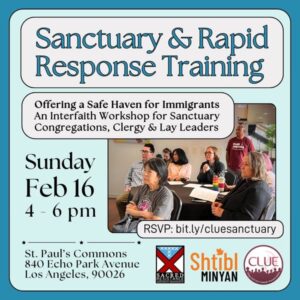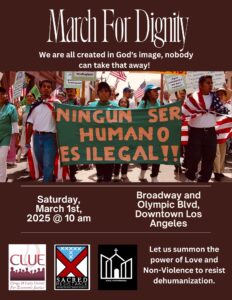 “Sacred Resistance 2.0” wants to connect with Episcopalians across the Diocese of Los Angeles, as the group creates regional hubs, offers trainings and resources, and reprises its 2016 networks in the wake of a federal immigration crackdown, group representatives said at a Feb. 6 online gathering of clergy.
“Sacred Resistance 2.0” wants to connect with Episcopalians across the Diocese of Los Angeles, as the group creates regional hubs, offers trainings and resources, and reprises its 2016 networks in the wake of a federal immigration crackdown, group representatives said at a Feb. 6 online gathering of clergy.
“Offering a Safe Haven for Immigrants: An Interfaith Workshop for Sanctuary Congregations, Clergy and Lay Leaders,” a sanctuary and rapid response training, will take place from 4 p.m. to 6 p.m. Sunday, Feb. 16, 2025, at St. Paul’s Commons, 840 Echo Park Ave., Los Angeles. Registration is available here.
Other trainings are planned, and additional resources are also available through the group’s Facebook and Instagram accounts.
The diocese is prepared to “make our way together through the wilderness” preaching and teaching and offering support as the federal government targets immigrants, People of Color and the Trans communities, Bishop John Harvey Taylor told clergy.
“Our immigrant worker colleagues and their families are feeling terrified,” Taylor said. “Our Trans colleagues and friends are being targeted and scapegoated. People of Color, our neighbors of African descent, are reading that important agencies of the government have canceled Black History Month commemorations,” he said.
But, as people of “resurrection, recovery, renaissance, and restoration, when we walk together, when we hold one another by the hand, when we remain in touch, when we send the text, when we make the call when someone’s name or face pops into our heads, as we glorify God and care for God’s people, we will make our way through the wilderness day by day.”
IRIS emergency appeal aids stranded refugees
The Interfaith Refugee and Immigration Service (IRIS), an institution of the diocese which has aided more than 15,000 refugees and immigrants since its 2004 formation, has been decimated by the federal crackdown, executive director Troy Elder told the online gathering.
“It’s been a tough week,” said Elder, who anticipates major staff reductions. “We have payroll through the end of March; we’re hopeful we’re going to be able to survive with a skeleton staff from some other funding sources, but we’re going to emerge from this a very slender IRIS, and focusing, at least at the outset, on Afghans and Ukrainians, because there was some state funding secured for that.”
The agency’s emergency appeal has raised about $16,000 to assist stranded refugees, who had recently arrived in the area. “Imagine, just coming to this country, … and then being told, Oh, by the way, we don’t have the money for your initial rent payment,” said Elder. He expressed gratitude for the support and asked for job placement assistance for staff being let go.
The IRIS Emergency Appeal continues here.
Sacred Resistance
In 2016, a month after Donald Trump was first elected president, delegates attending the 121st annual meeting of Diocesan Convention declared Los Angeles a sanctuary diocese and pledged to resist then-threatened mass deportations. The resolution also called upon individual churches to consider becoming sanctuary congregations, “serving as places of welcome, refuge, healing, and other forms of material and pastoral support for those targeted by hate due to immigration status or some perceived status of difference.”
A brief introduction to Sacred Resistance may be found here.
The group’s organizers include: the Rev. Canon Jaime Edwards-Acton, rector of St. Stephen’s, Hollywood and priest-in-charge at St. Barnabas, Eagle Rock; the Rev. Francisco Garcia, recently returned to the diocese after graduate studies; the Rev. Greg Kimura, rector of St. James, South Pasadena, and the Rev. Susan Russell, diocesan canon for engagement.
Churches and individuals interested in learning more and in participating are asked to provide Sacred Resistance with their information via this form.
Sacred Resistance encourages the distribution of Know Your Rights cards, available in a variety of languages. Templates for the cards are also available that can be printed in-house. Cards are also available through the Immigration Legal Resource Center. Sacred Resistance leaders recommend helping vulnerable families plan for worst-case scenarios using immigration family preparedness guides. Leaders also recommended that private property be clearly marked — which should prevent ICE entry without a signed judicial warrant for an individual — with signs like this one.
“We’re really focused on creating these hubs, training one another in knowing your rights and family preparedness … supporting one another, in events that we might have or actions that we might have,” Edwards-Acton said. “We’ve got to get the word out to our vulnerable brothers and sisters out there, immigrant brothers and sisters. We still do have rights, and we need to stand up for those rights, and so we need to let our immigrant brothers and sisters know what their rights are. And we do that through trainings.”
Equipping church volunteers and staff with knowledge of legal rights is essential, especially as many churches have feeding programs, homeless shelters and schools that could become ICE targets, Kimura said. For example, everyone – citizen or not — has the right to remain silent and to refuse entry into their home, without a warrant signed by a judge or magistrate with an individual’s name on it. They also have the right to refuse a search of their belongings.
 Asserting these rights slows down the deportation process, “because what they want to do is round people up, send them to a detention center, and get them across the border” as quickly as possible. “You slow it down by videotaping things,” Kimura said. “If somebody gets picked up, they say, I need to talk to my lawyer, that slows the process down.”
Asserting these rights slows down the deportation process, “because what they want to do is round people up, send them to a detention center, and get them across the border” as quickly as possible. “You slow it down by videotaping things,” Kimura said. “If somebody gets picked up, they say, I need to talk to my lawyer, that slows the process down.”
Rapid response networks are under development, to function as a hotline to dispatch witnesses to record ICE activity and provide support to those targeted. Some churches also are creating legal funds to aid those who have been detained and awaiting deportation, Edwards-Acton said.
Another resource suggested is the Sacred Ground Curriculum, available through The Episcopal Church, a film and readings-based dialogue series focused on racial reconciliation and grounded in faith.
Other events and resources:
• 11:30 a.m., Sunday, Feb. 16, St. George’s, Laguna Hills, is hosting a “What to Do if ICE Shows Up at your Church” forum in conjunction with the Orange County Labor Federation;
• 10 a.m. Saturday, Feb. 22, Holy Faith, Inglewood is hosting a community forum on “Know Your Rights when ICE Shows Up,” with CLUE, Clergy and Laity United for Economic Justice;
• 10 a.m., Saturday, March 1 – an interfaith March for Dignity in Los Angeles, starting at Olympic and Broadway and marching to First and Broadway downtown.
• Sacred Resistance offers a spreadsheet of resources here.
• A guide for nonprofits regarding immigration enforcement is here.
• A guide to family preparedness in the event of ICE deportation is here.
• California Rapid Response numbers can be found here.
Further resources are available on the Sacred Resistance website. Please send relevant resources, information, or questions for Sacred Resistance to hopeinhollywood@gmail.com.
